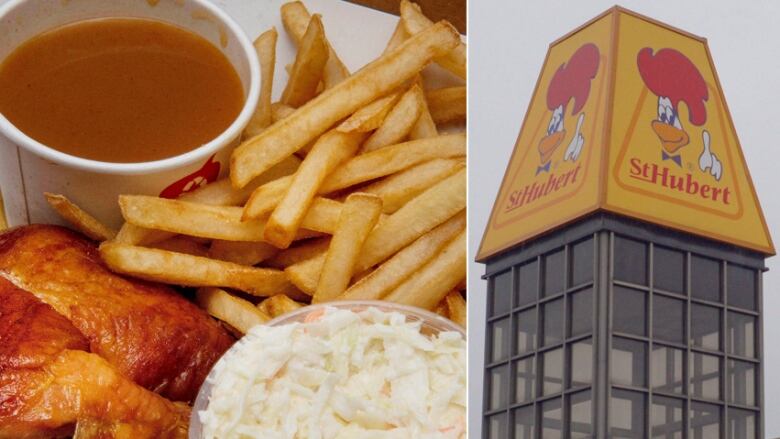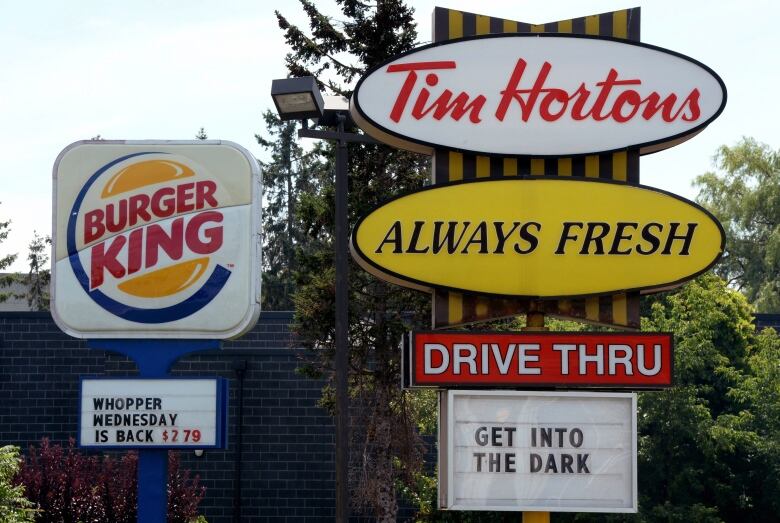Restaurant chain conglomerates forced to 'steal customers' in flat market
Cara acquired 120 outlets from the Quebec-based restaurant chain for $537 million

Quebecers just love their St-Hubert chicken.
So much so that the chain boasts the highest customer loyalty out of any restaurant in Canada, with the exception of Tim Hortons, according to industry analyst Robert Carter.
That's why it's a no-brainer that the Ontario-based Cara Operations Ltd., trying to expand its market share in a marketplace that's flat and hasn't seen growth in five years, would gobble up the popular Quebec-based restaurant chain.
- Swiss Chalet ownersCarabuying St-Hubert for $537M
- St-Hubert sale flares frenzy of rotisserie-related tweets
- St-Hubert sale toSwiss Chalet sparks quick reaction in Quebec
- St-Hubert's rise in Quebec
"Canadians are just not going out more often to restaurants. They're maintaining their usage of restaurants," said Carter, executive director of foodservice at The NPD Group, a market research firm. "In that environment, the only way to grow is to steal shares."
Cara announced Thursday it had acquired the 120 St-Hubert chicken outlets, plus two food manufacturing plants and two distribution centres, for $537 million.
"If you're a restaurant operator, you need to literally steal customers from your competitors," Carter said. "But in order for something like a Cara to grow, they're literally buying market share. They're buying a chain to increase their market share."
Quebec, in particular, is a difficult market to break into for full-service restaurant (FSR) chains, says Richard Wade, a professor at Ryerson's Ted Rogers School of Hospitality and Tourism Management.
"You don't see the proliferation of FSR brands in Quebec, like the rest of the country. So this gives [Cara] a real presence in the marketplace."
The purchase of St-Hubert adds to Cara's ever-growing restaurant chain empire that already includes brands like Swiss Chalet, Harvey's, Kelsey's and Milestones.

But there are other Canadian conglomerates in the arena, like MTY Group. In the last few years, the Quebec-based company has acquired chains like Big Smoke Burger and Mucho Burrito to add to a roster that includes Mr. Sub, Mr. Souvlaki, Yogen Frz, Thai Express and Manchu Wok.
Also in the mix is the Ontario-based Restaurant Brands International, which may only have two franchises under their umbrella, but they're two of the biggest: Burger King and Tim Hortons.
And then there's the smaller conglomerates, like Crave It Restaurant Group, which owns The Burger's Priest, Stoney's Bread Company and Via Cibo. (The partners of Crave It previously owned the franchise conglomerate Extreme Brandz, but sold off its restaurants, including Extreme Pita and Mucho Burrito, to MTY.)
'Dynamic had really shifted'
According to the 2015 Canadian Chain Restaurant Industry Review, there were 71,663 commercial restaurant units across Canada, with 52 new chain stores opened. While commercial unit growth stayed flat, the review said, chain stores appeared to do a better job at attracting customers compared to independents.
"The restaurant market 10 years ago, the majority of restaurant traffic went through independents and small regional chains," Carter said. "Over the last 10 years, that dynamic has really shifted."
Last year saw the more closures of independent restaurants in the history of tracking such statistics, he added.
While conglomerates continue to add to their empires, there are some independent regional chains, like St. Louis Wings Bar and Grill and Browns Socialhouse, continuing to thrive. There are still somewhere between 50 to 100 regional chains across Canada, Carter said.
"This is probably the one sector where you see the most bankruptcies and closures," said Sylvain Charlebois, a professor of marketing and consumer studies at the University of Guelph's Food Institute.
The consolidation trend, he said, is a result of systemic pressures like labour and food costs. "That's certainly a key driver to more consolidation in the future," he said.
'Small chains just can't compete'
The advantage of a number of brands coming under one umbrella is that it places independent regional chains and single restaurants at a significant disadvantage when it comes to advertising.
"They just can't compete with the marketing departments of these large chains," Carter said. "If you were a small chain coming up, 10, 20 years ago, if you open the door, if you have a good product, people came.
"Now you have social media, you've got to connect with your consumers, you have to create brand awareness, so the more resources you have for that stuff, the better your business is going to be."
Carter adds: "Small chains just can't compete at that level so they need other areas to compete on. They need to compete on innovation and just finding a really specific niche in the market and just own it."
One type of restaurant becoming more popular is the fast casual, a step above fast food, with higher quality menus and where customers place their order, sit down and have their meal brought to them.
U.S.-based chains Chipotle Mexican Grill, Panera Bread and Five Guys are a few fast casuals that have brought their success north of the border.
"This is a real growth area in the market and that's where we'll see some small chains start to get a foothold," Carter said.












_(720p).jpg)


 OFFICIAL HD MUSIC VIDEO.jpg)
.jpg)



























































































